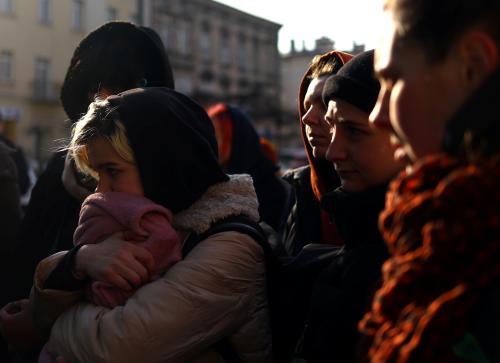As part of their most recent effort to make the case for staying the course in Iraq—and to portray their critics as weak—President George W. Bush and Vice President Dick Cheney have come up with yet another justification for the war. The reason America was attacked on September 11 2001, as Mr. Bush and Mr. Cheney now argue, is because its leaders—from Ronald Reagan to Bill Clinton—failed to respond forcefully enough to previous terrorist attacks, leading the terrorists to conclude that they could strike America without paying a price. As a framework for analysing today’s terrorist threat, the Bush-Cheney logic is woefully incomplete. And it risks leading the US administration down the wrong path in Iraq.
“To leave Iraq now would be to repeat the costly mistakes of the past that led to the attacks of September the 11th, 2001,” Mr. Bush said in an address in late September. “The terrorists saw our response to the hostage crisis in Iran, the bombings in the Marine barracks in Lebanon, the first World Trade Center attack, the killing of US soldiers in Somalia, the destruction of two US embassies in Africa, and the attack on the USS Cole. The terrorists concluded that we lacked the courage and character to defend ourselves, and so they attacked us.”
Mr. Cheney continued the narrative almost two weeks later, speaking to troops at Camp Lejeune. “The terrorists came to believe that they could strike America without paying any price,” Mr. Cheney said. “And so they continued to wage those attacks, making the world less safe and eventually striking the United States on 9/11.” The vice president then listed the same examples of alleged American weakness as the president, before concluding that “time and time again, for the remainder of the 20th century, the terrorists hit America and America did not hit back hard enough. As Mr. Bush has said, ‘the only way the terrorists can win is if we lose our nerve and abandon our mission’.”
Obviously, the US needs to kill or capture any terrorists who seek to harm it or any of its citizens. It must be prepared—as it did in Afghanistan—to use its unparalleled military power to destroy terrorists and their camps and when necessary, overthrow any government that gives them refuge. But to turn the war on terror into a single-issue contest in machismo—as if somehow the people blowing themselves up in Iraq or elsewhere can be deterred by America’s willingness to “hit back hard”—is misguided.
The Bush-Cheney emphasis on “credibility” may well apply to states or dictators who value their power and fear retaliation. Unfortunately, it is less relevant to the jihadis who have no power and often see US retaliation as a recruitment tool. Clearly, the jihadis in Iraq have not been cowed by the US-led invasion—if anything they have been inspired. Nor have anti-Israeli terrorists been persuaded to lay down their arms by Israel’s various military actions over the years, including bombing and occupying southern Lebanon, invading the West Bank and carrying out targeted killings. And even Russia’s brutal counterinsurgency tactics in Chechnya have failed to bring about the terrorist capitulation that Mr. Bush implies would result from a more resolute approach.
The lesson of all this for Iraq is not that the US should simply pull out, as some critics assert. As bad as the current situation may be, Mr. Bush is right that abandonment of the US military presence now could actually make things worse. It would send the message that terrorists can get their way as long as they are ruthless enough, condemn Iraq to the likelihood of civil war and encourage an even stronger jihadist presence. It would also create a geopolitical vacuum that would be almost certain to draw in—indirectly or even directly—Iraq’s neighbours such as Iran, Turkey, Syria and Saudi Arabia.
Instead, the lesson is that being tough is necessary, but on its own is not enough. While the US should not withdraw from Iraq, it should announce the goal now of troop reductions next year to make the military mission more sustainable politically—inside Iraq as much as within America—and salvage a badly overstretched US military. It should put pressure on Iraq’s Shia and Kurds to do more to give the Sunni minority a stake in the new Iraq—including by ending the purges of even low-level Ba’athists, and more equitably sharing oil revenues. It should place a higher priority on reconstruction activities in heavily Sunni areas to help turn the population against the resistance. Even if ongoing sabotage limits their effectiveness, job creation alone is a worthy goal in such places. It should also avoid employing military tactics that lead to high civilian casualties or widespread humiliation of Iraqis, even if this means foregoing some opportunities to show American “courage and character.” And it should unequivocally foreswear cruel and inhuman treatment of detainees, as proposed by Senator John McCain—rather than insist, as Mr. Bush in effect now does, that torture should remain an option.
America cannot be shy about eliminating those who wish to do it harm. But it is simply not true, as Mr. Bush asserts, that “the only way the terrorists can win is if we lose our nerve and abandon our mission.” They can also win if the US becomes trapped in the obsessive pursuit of demonstrating resolve and lose sight of the fact that in the long run, politics, not force alone, will defeat our enemies.



Commentary
Op-edIraq: U.S. Machismo is Not the Answer
October 25, 2005